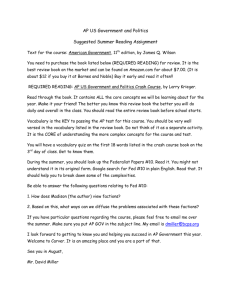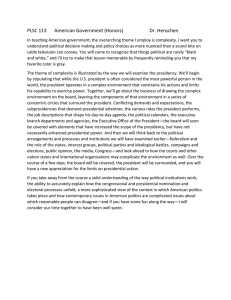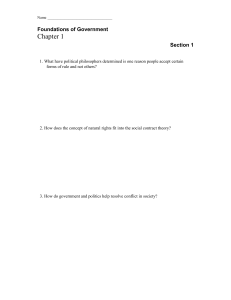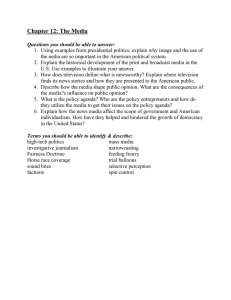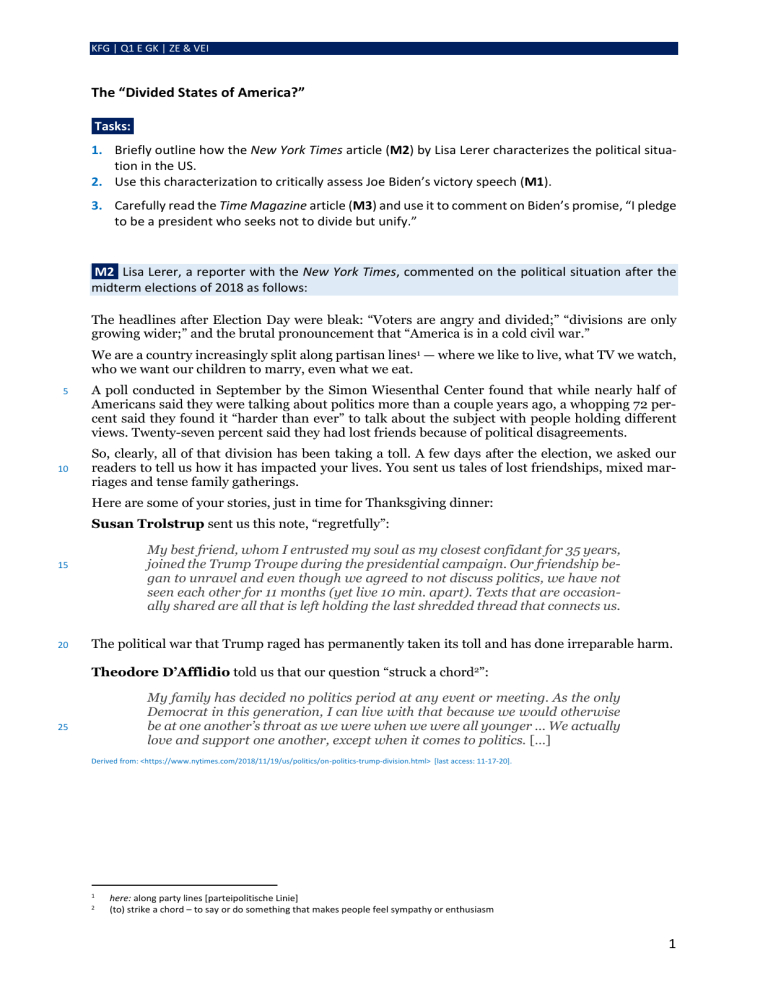
KFG | Q1 E GK | ZE & VEI The “Divided States of America?” Tasks: s 1. Briefly outline how the New York Times article (M2) by Lisa Lerer characterizes the political situation in the US. 2. Use this characterization to critically assess Joe Biden’s victory speech (M1). 3. Carefully read the Time Magazine article (M3) and use it to comment on Biden’s promise, “I pledge to be a president who seeks not to divide but unify.” M2 Lisa Lerer, a reporter with the New York Times, commented on the political situation after the midterm elections of 2018 as follows: The headlines after Election Day were bleak: “Voters are angry and divided;” “divisions are only growing wider;” and the brutal pronouncement that “America is in a cold civil war.” We are a country increasingly split along partisan lines1 — where we like to live, what TV we watch, who we want our children to marry, even what we eat. 5 10 A poll conducted in September by the Simon Wiesenthal Center found that while nearly half of Americans said they were talking about politics more than a couple years ago, a whopping 72 percent said they found it “harder than ever” to talk about the subject with people holding different views. Twenty-seven percent said they had lost friends because of political disagreements. So, clearly, all of that division has been taking a toll. A few days after the election, we asked our readers to tell us how it has impacted your lives. You sent us tales of lost friendships, mixed marriages and tense family gatherings. Here are some of your stories, just in time for Thanksgiving dinner: Susan Trolstrup sent us this note, “regretfully”: My best friend, whom I entrusted my soul as my closest confidant for 35 years, joined the Trump Troupe during the presidential campaign. Our friendship began to unravel and even though we agreed to not discuss politics, we have not seen each other for 11 months (yet live 10 min. apart). Texts that are occasionally shared are all that is left holding the last shredded thread that connects us. 15 20 The political war that Trump raged has permanently taken its toll and has done irreparable harm. Theodore D’Afflidio told us that our question “struck a chord2”: My family has decided no politics period at any event or meeting. As the only Democrat in this generation, I can live with that because we would otherwise be at one another’s throat as we were when we were all younger … We actually love and support one another, except when it comes to politics. […] 25 Derived from: <https://www.nytimes.com/2018/11/19/us/politics/on-politics-trump-division.html> [last access: 11-17-20]. 1 2 here: along party lines [parteipolitische Linie] (to) strike a chord – to say or do something that makes people feel sympathy or enthusiasm 1 KFG | Q1 E GK | ZE & VEI M3 Excerpt of the Time Magazine article “Apart. Not alone” by David French, published on 10 September 2020: […] My proposition is simple: In an atmosphere of increasing negative polarization and geographic separation [in the US], we can no longer take our nation for granted. We must intentionally care for the state of our union. 5 10 15 20 In “Federalist No. 10,” James Madison3 wrestled with the challenge of “the violence of faction.4” How does a nation deal with competing factions? Not through oppression and not through uniformity but rather through pluralism – by letting many different political flowers bloom. A broad diversity of interests and groups helps prevent any interest or group from attaining dangerous dominance. In his words, “the increased variety of parties comprised within the Union, increase this security.” […] [Healing the US also] means diminishing presidential power. A principal reason presidential politics is so toxic is that the diminishing power of states and Congress means that every four years we elect the most powerful peacetime ruler in the history of the U.S. No one person should have so much authority over an increasingly diverse and divided nation. The increasing stakes of each presidential election increase political tension and heighten public anxiety. Americans should not see their individual liberty or the autonomy of their churches and communities as so dependent on the identity of the President. But beyond the political changes–more local control, less centralization–Americans need a change of heart. Defending the Bill of Rights requires commitment and effort, and it requires citizens to think of others beyond their partisan tribe. Defending the Bill of Rights means that you must fight for others to have the rights that you would like to exercise yourself. The goal is simple yet elusive. Every American–regardless of race, ethnicity, sex, religion or sexual orientation–can and should have a home in this land. Derived from: <https://time.com/5887428/american-political-division/> [last access: 11-17-20]. 3 4 “Federalist No. 10” is one of the most influential political essays of the US. It was written by James Madison, founding father and 4th President of the United States. factions – here: opposing groups/parties [Fraktion, Interessengruppe] 2
